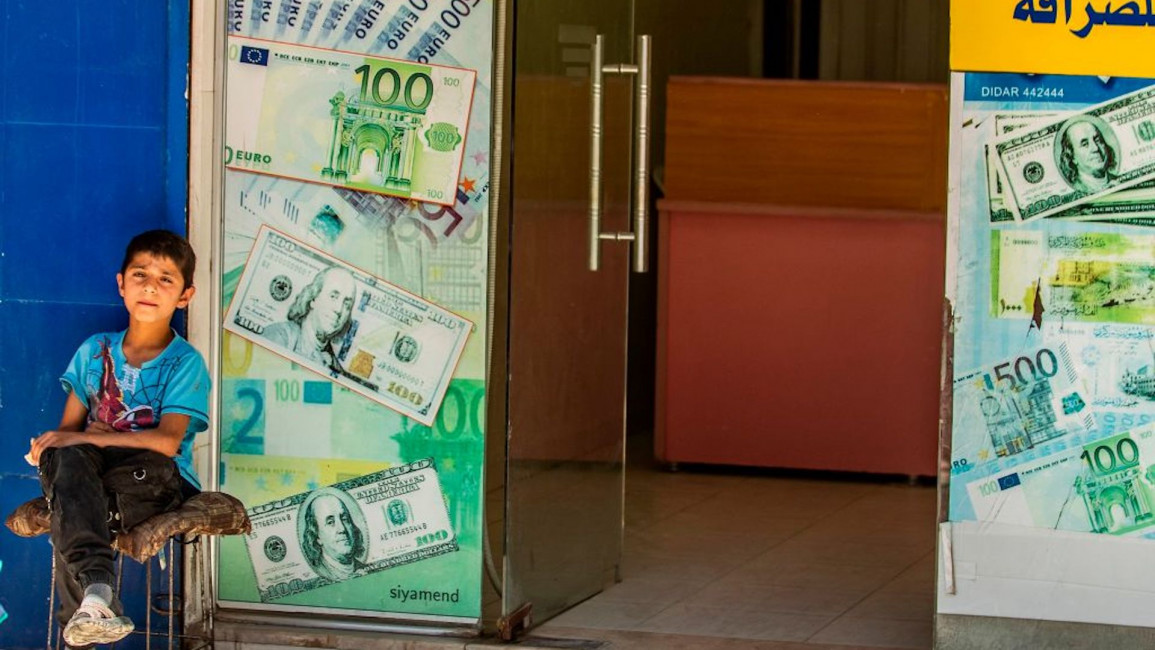Syrians forced to 'convert $100 to local currency' upon return
Syrians forced to 'convert $100 to local currency' upon return
'Like a visa to your own country': Syrians say the forced transaction through regime channels will cost nationals returning over $50 upon entry.
2 min read
Citizens would lose the value of over half the money in these transactions [Getty]
A recent decree signed by Syria's regime will require Syrians entering their own country to exchange $100 or other approved foreign currencies to the local currency at the official rate.
The move reflects the Syrian regime's desperation for hard currency after the US Caesar Act sanctions went into effect last month, analysts say.
"The regime is desperate for foreign currency, and ordinary Syrians have to pay for that," Ibrahim al-Assil, a political commentator and senior fellow at the Middle East Institute (MEI) said on Twitter.
The decree was signed on Wednesday by Prime Minister Hussein Arnous – appointed by President Bashar Al-Assad last month – and will go into effect in August.
To be allowed to re-enter, Syrians currently stranded abroad will have to convert US $100 or any other currencies accepted by the Central Bank of Syria to Syrian pounds in accordance to exchange set by the customs and aviation authorities.
While the official rate is set at 1250 Syrian pounds for one dollar, the market rate is over twice the amount due to depreciation, ranging from 2300 to 2600 depending on the region.
"What citizens lose goes into pockets of regime. I guess [it's a] way for Assad to cope with new US sanctions," Sam Dagher, a MEI Syria scholar wrote.
The decree only excempts those under 18 and drivers crossing borders from the mandatory currency exchange.
While Syrians wishing to return during the coronavirus pandemic have been stranded abroad for months while the embassy has yet to approve returns, the decree presents an additional challenge for those wanting to return from the neighborhing Lebanon, where hard currencies have become scarce.
Read also: Sanctions, Covid-19 and economic collapse: What is the future of international aid to Syria?
Aref al-Shaal, a lawyer from Damascus, called the decree unconstitutional on his Facebook page, saying it goes against Article 38.
"Article prohibits preventing a citizen from returning to his homeland or placing administrative obstacles in the face of this return," Shaal said, adding that the state was making an assumption that all returning are in possession of $100 bills.
Follow us on Facebook, Twitter and Instagram to stay connected
The move reflects the Syrian regime's desperation for hard currency after the US Caesar Act sanctions went into effect last month, analysts say.
"The regime is desperate for foreign currency, and ordinary Syrians have to pay for that," Ibrahim al-Assil, a political commentator and senior fellow at the Middle East Institute (MEI) said on Twitter.
The decree was signed on Wednesday by Prime Minister Hussein Arnous – appointed by President Bashar Al-Assad last month – and will go into effect in August.
To be allowed to re-enter, Syrians currently stranded abroad will have to convert US $100 or any other currencies accepted by the Central Bank of Syria to Syrian pounds in accordance to exchange set by the customs and aviation authorities.
|
"What citizens lose goes into pockets of regime. I guess [it's a] way for Assad to cope with new US sanctions," Sam Dagher, a MEI Syria scholar wrote.
The decree only excempts those under 18 and drivers crossing borders from the mandatory currency exchange.
While Syrians wishing to return during the coronavirus pandemic have been stranded abroad for months while the embassy has yet to approve returns, the decree presents an additional challenge for those wanting to return from the neighborhing Lebanon, where hard currencies have become scarce.
Read also: Sanctions, Covid-19 and economic collapse: What is the future of international aid to Syria?
Aref al-Shaal, a lawyer from Damascus, called the decree unconstitutional on his Facebook page, saying it goes against Article 38.
"Article prohibits preventing a citizen from returning to his homeland or placing administrative obstacles in the face of this return," Shaal said, adding that the state was making an assumption that all returning are in possession of $100 bills.
Follow us on Facebook, Twitter and Instagram to stay connected


![Minnesota Tim Walz is working to court Muslim voters. [Getty]](/sites/default/files/styles/image_684x385/public/2169747529.jpeg?h=a5f2f23a&itok=b63Wif2V)




![Debris near Rafic Hariri International Airport [Getty]](/sites/default/files/styles/image_330x185/public/2176162423.jpeg?h=a5f2f23a&itok=MCSK9mkM)
![An Israeli air strike on Jabalia killed teenage journalist Hassan Hamad [Screengrab/X]](/sites/default/files/styles/image_212x120/public/2024-10/hassan%20hamad1.jpg?h=c12e0b96&itok=KstD_5xk)
